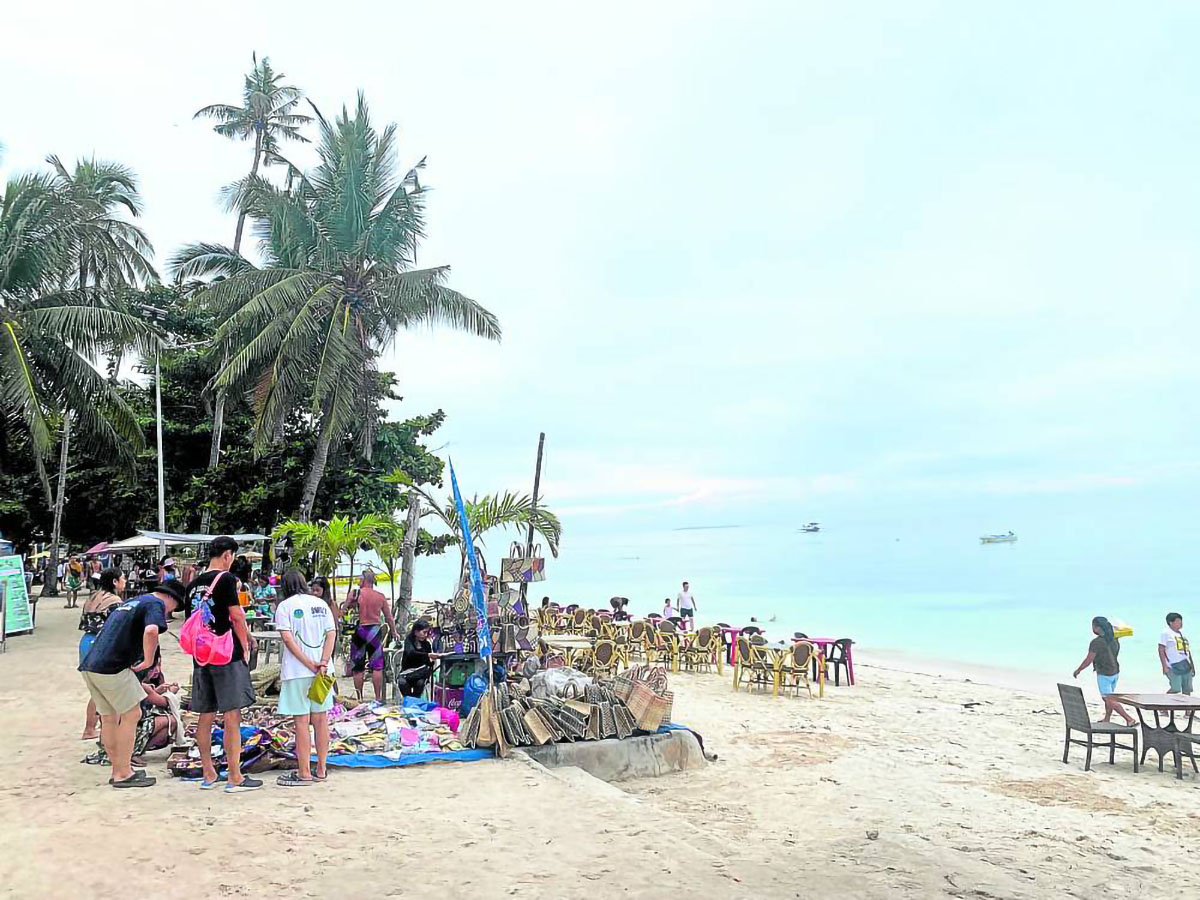
COMMERCE ON THE BEACH Vendors offer souvenir items to tourists on Alona Beach in this August 2022 photo. Bars, restaurants and hotels along the beach also set up dining areas on the beach so visitors can enjoy the view. ROBERT JAWORSKI L. ABAÑO
TAGBILARAN CITY, BOHOL, Philippines — Two major tourism sites in Bohol will undergo major environmental rehabilitation to preserve their natural beauty natural amid the influx of visitors.
Gov. Aris Aumentado said Alona Beach on Panglao Island and Balicasag Island were up for immediate restoration following inspections that he and government teams had done.
“It is about time to act to save and protect Alona Beach,” Aumentado said as the “Task Force Alona,” a joint effort of the provincial government and the municipal government of Panglao, was formed last week.
READ: Bohol resort closed for lack of business permit
Alona Beach, which has been likened by visitors to a scaled-down version of Boracay Island in Aklan due to its white beach and clear waters minus the crowd, is named after the late actress Alona Alegre, who starred with the late actor Fernando Poe Jr. in the 1973 movie, “Esteban,” which was filmed there.
In 2018, Boracay also underwent an intensive environmental rehabilitation as it suffered from overdevelopment and high tourist traffic.
Aumentado said the rehabilitation of Alona Beach would include the slope protection or enhancement of seawalls, sand erosion prevention, and tree preservation along the coastline in Barangay Tawala.
The 20-meter easement of the beach would also be cleared.
The rehabilitation project for Alona Beach is funded by the Department of Tourism’s Tourism Infrastructure and Enterprise Zone Authority (Tieza) at an estimated cost of at least P100 million, said the governor.
Aumentado along with Panglao Vice Mayor Noel Hormachuelos, representatives of Panglao Mayor Edgardo Arcay, and Uco Trotin and Thomas Boetsch, president and vice president of the Alona Beach Community Association Inc. (Abcai), respectively, inspected the coastline last week.
Abcai members have committed to oversee the rehabilitation efforts in coordination with village officials.
No structures, facilities, and vendors will be allowed to construct anything within 20 meters from the waterline to the inland area while fire dancing activities on the shoreline is also prohibited.
Starting May 1, dive and island-hopping boats will no longer be allowed stay in waters near Alona Beach.
The road leading to the beach will also be closed to traffic, except for service vehicles bringing supplies and guests of establishments in the area.
In the long run, Task Force Alona will also focus on ensuring that sewage facilities, proper drainage, sustained water quality and regulation of dive shops are in place.
For decades, Alona and other resorts in Panglao have been suffering from environmental problems due to unregulated development, lax enforcement of laws, and continued surge in tourist arrivals.
While the province enacted an environment code in 1998, local officials did not enforce it which led to several environmental violations in Panglao.
In April 2019, some resort owners removed illegal structures within the 20-meter easement zone, including seawalls and riprap, but some of these structures were rebuilt.
Toilets, potable water
On Balicasag Island, one of the best site for diving and snorkeling in the country, Aumentado saw several problems, including the need for proper toilets and potable water.
In his visit to the island last week for a dental and medical mission, Aumentado discovered many makeshift stalls where residents sell food, ornaments and rent out snorkeling equipment.
Aumentado said the “talipapa-like stalls” would be fixed.
“There will be a common area where they can sell their goods so that it will not be an eyesore,” he said.
Aumentado also discouraged residents to stop the “one-time, big-time” scheme where some residents approach tourists offering introductory diving lessons.
Without proper guides and gears, the practice, he said, will damage the island’s coral reefs and beds.
Aumentado said the provincial government would build toilets that tourists and divers can use.
Since potable water is a problem on the island, Aumentado asked residents to send a request to his office for the construction of a desalination plant for 260 households.